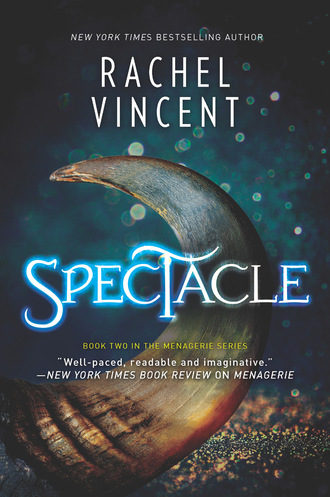
Полная версия
The Menagerie Series
At the door, Bowman bound my hands at my back with padded restraints, which told me that the staff wasn’t sure they could control me with a collar until they knew my species. And that the clientele didn’t want to see visible signs of abuse on their high-priced exotic chattel—except whatever marks they might inflict themselves.
“What’s this about?” I asked as I followed Bowman into the hall, taking note of the fact that he’d come for me alone. But armed.
He pressed a button on his remote as we approached an exit on the opposite side of the building from where we’d come in the night before, but his lips remained sealed as he pushed the door open.
“You don’t know, do you? You’re just an errand boy, right?” I asked, as I stepped out onto a sidewalk that felt rough and cool against my bare feet.
Bowman marched me past a row of nondescript single-story buildings, each built of gray or beige brick punctuated at regular intervals by windows too narrow for a human to pass through, even if the glass were broken. We were clearly on the operational side of the grounds, which obviously wasn’t meant to be seen by Vandekamp’s clientele.
At the end of the row of ugly buildings, we took a right, then approached a beautiful iron gate in an intricately patterned stone wall. Bowman pressed an icon on his remote to allow me through the gate, and a red sensor blinked between two stones near the ground, embedded right into the mortar.
When we walked through the gate, concrete gave way to smooth stone pavers beneath my feet and I caught my breath as I took in the stunning series of gardens and buildings that made up the Savage Spectacle’s grounds.
At first, I could only stare, wide-eyed, at the botanical zoo spread out around me, cut from various shrubs dotting the broad, neat lawn. The cryptid topiary was astonishing and incredibly intricate, yet the details conformed more to fantasy than to true anatomy.
To my left, two box-tree centaurs appeared frozen in midtrot, alternate legs gracefully curled beneath them as they ran, long human hair trailing behind them, and their poses were so dynamic I almost expected their hooves to hit the ground when reality’s stopped clock resumed ticking. On my right, a shrubbery manticore brandished its eight-foot-long stinger-tipped scorpion tail against a griffin with a twelve-foot wingspan, swooping in from overhead by the grace of the strong, bare trunk holding it up like a doll on a stand.
As Bowman led me across the courtyard, down winding stone paths and past iron arches leading to other areas of the grounds, I gawked at a small herd of shrubbery satyrs playing flutes in a semicircle, as if the artist had drawn inspiration from Renaissance-period stereotypes rather than actually going to see a satyr.
Past a gazebo surrounded by playful-looking elves that could have frolicked right off the front of a cookie box, I found a beautiful stone fountain spilling water from three tiers. Poised above it, as if they were about to dive into two feet of water, were two mermaids and a selkie emerging from her seal skin, all trimmed from massive bushes planted on three sides of the fountain. As with the griffin, they were held up by the pruned-bare center trunks. Unlike the griffin, however, those figures bore little resemblance to reality.
A selkie would shed her seal skin as she emerged from the water, not as she dived into it, and mermaids...well... In reality, their upper halves didn’t resemble human lingerie models anywhere near as closely as the topiary might lead one to believe.
Disgusted, I turned away from the elaborately inaccurate portrayals and focused on the back of the building we seemed headed for: a stately three-story structure with a massive back porch set up for fine dining outdoors.
Through small gaps in a tall wall of shrubbery, I caught glimpses of an empty parking lot set back from the building and an unattended valet stand.
Bowman marched me around the elaborate back porch, then used his remote to allow me entry through a small side door up a narrow set of steps. The door opened into a back hall, where Bowman’s boots echoed against the hardwood. My bare feet were silent on the cold floor.
We passed through a tall rear foyer tiled in marble and paneled with dark wood, where abstract sculptures stood on marble pedestals. I stared at the display of wealth and opulence, awed for a second, until I realized that Willem Vandekamp financed the luxury—and no doubt his technological breakthroughs in cryptid containment—with the exploitation of helpless, suffering captives.
“This way.” Bowman marched down a left-hand hallway without me, assuming I’d follow, and for a second, the uncharacteristic carelessness of that action gave me hope. Then a low-powered jolt came from my collar to spur me on, and I understood. He was demonstrating how little effort it took to keep a captive in line with the press of a single button.
At the end of the hall, Bowman tweaked another setting to allow me through another doorway into a richly adorned office suite.
A young, attractive assistant glanced up from her computer screen, her fingers paused over the keyboard. When she saw me, she frowned, then pressed a button on the telephone next to her keyboard. “Mr. Vandekamp, that cryptid is here.”
“Send her in,” came the reply.
Bowman opened the inner office door and escorted me inside.
Willem Vandekamp sat at his desk, but standing to his left was a petite woman in her midthirties, wearing a white blouse and a knee-length pencil skirt. She wore low heels and perfect makeup, and stood with her arms crossed over her chest. Her nose crinkled as she studied me, and I wondered if she was more offended by my appearance or my smell. I hadn’t showered in at least two days, nor had I brushed my teeth.
Two chairs stood in front of the massive, ornate desk, but I was not offered one, so I stood in the middle of the room, staring back at Vandekamp while he stared at me. Bowman stood at my side, at attention, ready to disable me with his remote, should I suddenly appear threatening.
Finally, the woman exhaled with a frown. “I see the problem.”
“I have your blood test results.” Vandekamp lifted one edge of a sheet of paper from his desk, and he seemed both annoyed and fascinated with whatever was printed on it.
I shrugged without even a glance at the paper. “I tried to tell your handlers.”
“We ran the test twice and found no trace of any nonhuman enzyme or hormone,” he continued, as if I hadn’t spoken. On my right, Bowman suddenly seemed to stand even stiffer with the news, though I couldn’t tell that he’d actually moved. “The sheriff of your hometown said the state of Oklahoma got the same result, which they assumed to be a lab error. But even if my lab made mistakes—and it does not—two labs independently making the same error, twice each, is beyond the realm of both possibility and coincidence. Yet I’ve personally seen you take on characteristics no human could possibly possess. How can that be?”
I shrugged, and the padded cuffs dragged the back of my shirt. I wasn’t sure how I’d been chosen as a furiae, or what force had chosen me, but I saw no reason to share what I did know with a man who intended to rent me out by the hour.
“Can you control it?” The woman’s brown-eyed gaze stayed glued to me, as if my every inhalation might reveal some clue. “Or are you at the mercy of your beast?”
“I am at the mercy of nothing.” That one wasn’t so much a lie as a personal goal.
“Show us your inner monster,” she ordered, and Bowman tensed in anticipation. When I only stared back at her, she pulled a familiar remote control from her pocket and aimed it at me as she tapped something on the screen. I braced myself for searing pain in every nerve ending, but nothing happened.
She glanced at her remote in irritation. “Willem?”
“We can’t program the prompt command until we know what she is,” he explained.
“Why not?”
I laughed, amused to realize I understood what she did not. “Because that’s done by stimulating hormonal and neurological reactions through the needles penetrating my spine. Which you can’t do until you know what reactions to stimulate.” And they might never know how if I denied them that information by refusing to release my inner furiae.
Or if the furiae turned out not to be triggered by anything they could stimulate.
The woman’s gaze hardened, but Vandekamp looked suddenly intrigued. “How do you know that?”
His files were obviously incomplete, and I had no intention of filling in the blanks—until I looked down at him, sitting behind his desk, and a sudden moment of déjà vu reminded me where I’d seen him before.
“Willem Vandekamp.” I turned the syllables over in my head. “You’re Dr. Willem Vandekamp. I took your seminar at Colorado State.” During my senior year as a cryptobiology major. He hadn’t had the scar then, but... “You did a six-week lecture series on hormonal impulses in cryptid hybrids, and you had this theory that cryptids could be hormonally neutered.” A wave of nausea washed over me along with the obvious conclusion. “I guess that’s more than a theory now, huh?”
The woman’s eyes widened as she turned to him. “You taught her? In class?” Something in her voice—in the casual anger with which she addressed him—told me she was not an employee. Not just an employee anyway.
“You went to college.” Vandekamp stood and walked around his desk to sit on the front edge of it, eyeing me more closely, and suddenly I realized that though he was now addressing me, he hadn’t so much as greeted his own employee. “That’s not in your files.”
I shrugged. “Your university bio didn’t mention your ‘private collection.’” For obvious reasons. Even if the Spectacle wasn’t actually breaking any laws—and I found that hard to believe—its clientele would expect the kind of total anonymity that can’t come from a service advertised to the general public.
“You were my student. Fascinating!” Yet Vandekamp looked more like he wanted to dissect my brain than discuss my senior thesis.
“And you were a very good teacher. I may not understand how you’re doing what you’re doing, but I understand why it works. And in my case, why it won’t.”
“This one isn’t like the others,” the woman—his wife?—said, and the sharp edge in her voice could have cut glass.
“I’m like them in every way that matters,” I insisted.
“Yet you look human. Like a surrogate.” She spoke through clenched teeth. “What if she’s a surrogate, Willem? What if the government missed one? What if this is what they look like, all grown-up?”
Vandekamp twisted to pick up a file from his desk blotter. He flipped open the folder and scanned the first page. “She’s only twenty-five. Too young to be a surrogate.”
“Yes, and the test results say she’s human, but we know that’s not true. If she’s a surrogate, you could wake up one morning to find that you’ve stabbed me in some kind of psychotic trance. Doesn’t it say in that file that she made a man electrocute himself?”
My brow rose. “You believe that part, but not my birthday? I—”
She pressed her thumb against her remote screen, and pain shot through my throat. I cried out, and bent at the waist as I strained my shoulders trying to reach for my neck. But my voice carried no sound and my hands were still cuffed at my back.
The pain faded quickly, but my voice did not return.
“Cryptids don’t have birthdays,” the woman snapped, as I tried in vain to speak. My mouth opened. My lips and tongue moved. But my vocal cords did not vibrate. My brain was sending the signal to speak, but my body wasn’t receiving the order.
It was being intercepted by the collar.
In the menagerie, the handlers had sometimes muzzled cryptids, but that could only stop them from biting and speaking. Muzzles can’t prevent you from making sound. From hearing your own voice, as a reassurance that you do, in fact, still exist, even if only as property to be bought, sold or rented out.
But Vandekamp had found a way to turn off my voice, and the resulting claustrophobic terror felt as if the room was folding in on me. As if I were screaming into the void of some shrinking reality that no longer had enough space for me. As if soon they would cease to see me too, and start walking through me.
“So what do you suggest we do with her, Tabitha?” Vandekamp circled his desk again to sit behind it. “Sell her? Have her euthanized?”
My silent objection became a fruitless scream of rage. I strained the muscles in my throat, trying to be heard, until my eyes felt like they’d pop from my skull. But neither of them even looked at me.
I turned to Bowman to find him staring straight ahead, impervious to my frustration and fury.
“That seems a bit extreme,” the woman—Tabitha—said. “We’re going to have to inspect her. All monsters have telltale features. We just have to find hers.”
She turned to me, and again I tried to shout. To tell her that I’d already been inspected. I knew my desperate effort was pointless, but I couldn’t stop.
“Take off your clothes,” she ordered.
My profanity-laden refusal didn’t make so much as a squeak.
She pressed another icon on her remote, and pain exploded all over my body. I fell to my knees on the carpet, hunched over, my arms straining against my restraints. Screaming in silent agony.
What I’d felt when I’d slid my finger beneath my collar was a flash in the pan compared to the fire blazing through every nerve in my body.
“Tabitha,” Vandekamp said. “She can’t undress. She’s handcuffed.”
His wife finally released the button.
I slumped over my knees, breathing deeply as the pain slowly receded. I felt tender all over, but I couldn’t tell if that was a residual effect of the electric current or simply the knowledge that if I didn’t cooperate, she would press that button again.
“And anyway, she was inspected during the intake process. She has no cryptid features. Which is part of the problem.”
“I don’t understand,” she complained. “Even the most benign-looking monsters have an identifiable trait hidden somewhere. How could she have nothing?”
Finally, I made myself sit up and look at the Vandekamps, and the effort that took without the use of my hands was terrifying.
“What are we going to do with her?” Tabitha demanded as she smoothed a strand of brown hair back toward the simple twist it had escaped from. “No one’s going to pay to see that.” She waved one hand at me in disgust. “You’re going to have to figure out what she is. Make her talk.” She shrugged, and her cold gaze chased the last reverberating bolts of fire from my body. “Or I could do it.”
“I’ll figure something out.” He stood and kissed her on the forehead. “Why don’t you go tell the seamstresses what you want for the new costumes?”
She hesitated, then nodded reluctantly. “I do have a few ideas...”
As the door closed behind her, he sat on the front of his desk again. “Wait outside,” he said, and I thought he was talking to me until Bowman turned sharply and headed into the outer office, closing the door at his back. Vandekamp looked down at me, where I still knelt on his rug. “You were the one responsible for the takeover of Metzger’s Menagerie?”
I nodded. The truth was more complicated, but without my voice, I couldn’t explain about the team effort.
“I have some questions for you, and I suggest you answer them while you still can.” He pressed an icon on his remote, and when I felt no pain, I realized he’d given me back my voice.
Vandekamp twisted and lifted another folder from his blotter, then flipped it open. “According to the menagerie’s records, there are two cryptids missing. A werewolf called Claudio and a young marid named Adira. Where are they?”
I cleared my throat and was relieved by the sound that met my ears. “Adira died during the coup. She was shot by the Lot Supervisor. Christopher Ruyle.” We’d sent her body to the sultan so he could bury her.
Vandekamp glanced at the report again. “This Ruyle is also missing.”
“He’s dead. And for the record, he’s the only employee who died in the takeover.”
“And the werewolf?”
I held his gaze. And my silence.
He lifted the remote, drawing my attention to it. “You already know what this can do.”
I exhaled. I didn’t want to betray Claudio, but chances are that they’d never catch him anyway. “He left the menagerie last month.”
“Why would he leave? A werewolf cannot pass for human.”
“But he can live in the woods as long as he likes.” He was looking for Genevieve, the youngest of his children, who had been sold right before the coup. But I wouldn’t tell Vandekamp that no matter how much pain he put me through.
“How did you know about the coup?”
Surprise tugged up on Vandekamp’s left brow. “You haven’t figured out your mistake yet?”
I’d spent my time alone in that concrete cell going over every decision I’d made as the de facto manager of the liberated menagerie, trying to figure out how I’d failed the very people I’d been trying to save. I’d come up with a thousand small mistakes, but nothing I could pinpoint as our downfall.
“I found out from the Metzgers.” Vandekamp watched carefully for my reaction, but I had none to give him, except confusion.
“The Metzgers don’t know.” Raul and Renata had flawlessly covered our tracks with the former owner’s family.
“The Metzgers found out from old man Rudolph himself.”
“But Rudolph Metzger is...” I let my words fade into silence short of a confession.
“Dead,” Vandekamp finished for me. “Which is the inevitable result of dismembering a man and mailing a piece of him to each of his remaining relatives.”
“We didn’t—”
He shook his head, still watching me closely. “No, that didn’t seem like something you would do, after all the trouble you went through to hide the takeover.”
Sultan Bruhier. Adira’s father got his final revenge on us by exposing the coup that had cost his daughter her life. But the sultan couldn’t have shipped pieces of Rudolph Metzger all over the country if I hadn’t given him the old man in the first place.
Vandekamp’s viewing of my reaction seemed part entertainment, part clinical observation. So I swallowed my guilt to deny him the pleasure.
“What did you do with Gallagher?” I demanded, and his fleeting frown made my stomach flip. He didn’t recognize the name.
Gallagher wasn’t at the Spectacle. He’d been sold to someone else or sent to a cryptid prison or—worst-case scenario—given to a research lab.
A cold new fear overtook me. No matter where he was, he would fight to get to me.
I stared at the floor, struggling to control my horror at that thought. Or at least hide it from Vandekamp.
“Until we know what you are, you’re a financial liability,” he said, and I forced myself to focus on his words. “You can enlighten me, or I can let my lovely wife pull the information out of you. But I don’t think that’s what you want.”
No use denying that. Tabitha Vandekamp was scary in a way no thick-fisted roustabout had ever been. But she couldn’t change the facts.
“I’ve told you.” I shrugged, mentally tamping down the fear that he might recognize my half-truth. “Run the test again. The results will be the same, and no amount of torture will change that. I’m human.”
Vandekamp crossed his arms over his shiny blue button-down shirt. “I’ve seen you turn into a monster, Delilah.”
“The two are not mutually exclusive.” I shrugged and held his gaze. “You and I have that in common.”
Willem
Willem Vandekamp watched the office door close behind his latest purchase, and for a moment, he sat lost in his thoughts. After more than twenty years in the cryptobiology field, he’d long been convinced that nothing could surprise him.
Until Delilah.
A cryptid who went to college.
A cryptid who’d taken his seminar.
She understood too much, but the real problem Delilah represented wasn’t how much she knew about him, but how little he knew about her.
Delilah would make the investors nervous. She would terrify his friends in Washington.
Speaking of whom...
Willem glanced at his watch, an obsolete device in the age of cell phones and handheld tablets, but one that gave him comfort in its simplicity. He was two minutes late for the conference call, but had no intention of actually picking up the phone for another three. Punctuality might give those congressional blowhards the mistaken impression that his time was less important than theirs.
What if Tabitha was right? Willem leaned back in his chair and linked his hands behind his head, still staring at the door. What if Delilah was a surrogate? No one had seen a single one of those sadistic little bastards since the government rounded them up nearly thirty years ago. They’d be thirty-five years old now—a full decade older than Delilah—but who knew whether they’d age like humans? Hell, if they were some kind of fae, their glamour could make them look like anything or anyone.
But Delilah wasn’t fae. According to her file, the sheriff who’d originally arrested her had kept her in iron cuffs with no effect.
Willem’s desk phone rang. His direct line. He noted the DC area code on the display and smiled. Then he let it ring two more times before he answered.
“Hello?”
“Vandekamp.” Senator Aaron sounded distinctly displeased. “We had an appointment, unless I’m mistaken?”
“I apologize.” Willem spun in his chair to look out the window at the topiary garden. “It’s been a bit chaotic here, and I’m running on about three hours of sleep.”
“Does that mean the rumors are true?” the second voice demanded in an eager baritone.
“If the rumors say that I have retaken Metzger’s Menagerie from the creatures who escaped their cages and killed the owner, then yes.”
“How could this have happened?”
“It couldn’t have, if my restraint system were federally subsidized and put into production,” Willem pointed out, without bothering to filter sharp criticism from his tone.
“If your restraint system were more than a prototype, that might be a possibility,” Senator Aaron said. “Until then—”
“It’s ready.” Willem stood and paced the length of his office, his pulse roaring in his ears. “Come see for yourself. My technology is going to change the world, Senator. You can be on the forefront of the new wave or you can be crushed by the tide. Your choice.”
He dropped his phone into its cradle and took a deep breath. Then he pressed the intercom button and spoke without waiting for a greeting from his secretary. “I want a full recording from Delilah’s collar. I need to see every hormonal fluctuation on a timeline alongside video footage from her dorm. Every twelve hours.”
As the only creature at the Savage Spectacle that Willem could neither identify nor control, Delilah Marlow was the one thing standing between him and a government contract that would revolutionize humanity’s control over the beasts it shared the planet with.
She could not be allowed to derail two decades of progress.
Delilah
A couple of hours after the sun set, Woodrow, the gamekeeper, stepped into the dormitory to conclude our first-day orientation with an announcement that lights-out would be in half an hour. He told us to clean our teeth with the brushes we’d been issued and use the toilets, then warned us—again—that failure to follow orders would result in serious consequences.
The long-term Spectacle captives began filing into the bathroom in two lines, clearly accustomed to the routine. Lala and Mahsa were the first from our group to join them, and I stepped into line after them. “How was your work assignment?” I asked, as we shuffled forward after the others. “What were you doing?”
“Vacuuming some big room,” Lala said.
“Scrubbing the kitchens,” Mahsa added.
“Multiple kitchens?”
“Yeah.” The leopard shifter shrugged. “Two of them, in two different buildings. There may be more, though.” Her eyes widened. “Did you see the bushes?”












